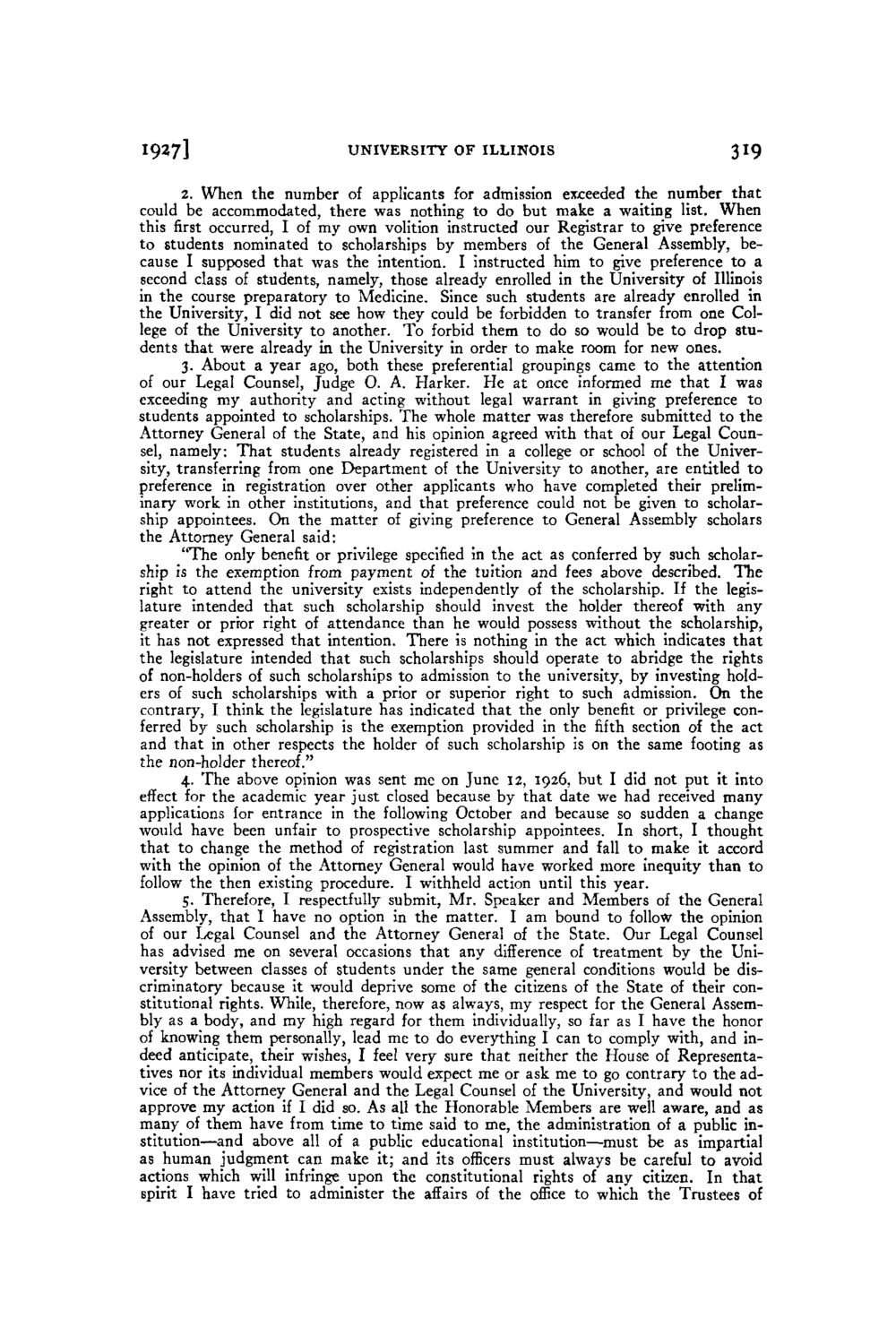| |
| |
Caption: Board of Trustees Minutes - 1928
This is a reduced-resolution page image for fast online browsing.

EXTRACTED TEXT FROM PAGE:
1927] U N I V E R S I T Y O F ILLINOIS 319 2. W h e n the number of applicants for admission exceeded the number that could be accommodated, there was nothing to do but make a waiting list. W h e n thisfirstoccurred, I of m y own volition instructed our Registrar to give preference to students nominated to scholarships by members of the General Assembly, because I supposed that was the intention. I instructed him to give preference to a second class of students, namely, those already enrolled in the University of Illinois in the course preparatory to Medicine. Since such students are already enrolled in the University, I did not see how they could be forbidden to transfer from one College of the University to another. T o forbid them to do so would be to drop students that were already in the University in order to make room for new ones. 3. About a year ago, both these preferential groupings came to the attention of our Legal Counsel, Judge O. A. Harker. H e at once informed m e that I was exceeding m y authority and acting without legal warrant in giving preference to students appointed to scholarships. The whole matter was therefore submitted to the Attorney General of the State, and his opinion agreed with that of our Legal Counsel, namely: That students already registered in a college or school of the University, transferring from one Department of the University to another, are entitled to preference in registration over other applicants who have completed their preliminary work in other institutions, and that preference could not be given to scholarship appointees. O n the matter of giving preference to General Assembly scholars the Attorney General said: "The only benefit or privilege specified in the act as conferred by such scholarship is the exemption from payment of the tuition and fees above described. T h e right to attend the university exists independently of the scholarship. If the legislature intended that such scholarship should invest the holder thereof with any greater or prior right of attendance than he would possess without the scholarship, it has not expressed that intention. There is nothing in the act which indicates that the legislature intended that such scholarships should operate to abridge the rights of non-holders of such scholarships to admission to the university, by investing holders of such scholarships with a prior or superior right to such admission. O n the contrary, I think the legislature has indicated that the only benefit or privilege conferred by such scholarship is the exemption provided in the fifth section of the act and that in other respects the holder of such scholarship is on the same footing as the non-holder thereof." 4. The above opinion was sent m e on June 12, 1926, but I did not put it into effect for the academic year just closed because by that date w e had received m a n y applications for entrance in the following October and because so sudden a change would have been unfair to prospective scholarship appointees. In short, I thought that to change the method of registration last summer and fall to make it accord with the opinion of the Attorney General would have worked more inequity than to follow the then existing procedure. I withheld action until this year. 5. Therefore, I respectfully submit, M r . Speaker and Members of the General Assembly, that I have no option in the matter. I a m bound to follow the opinion of our Legal Counsel and the Attorney General of the State. Our Legal Counsel has advised m e on several occasions that any difference of treatment by the University between classes of students under the same general conditions would be discriminatory because it would deprive some of the citizens of the State of their constitutional rights. While, therefore, now as always, m y respect for the General Assembly as a body, and m y high regard for them individually, so far as I have the honor of knowing them personally, lead m e to do everything I can to comply with, and indeed anticipate, their wishes, I feel very sure that neither the House of Representatives nor its individual members would expect m e or ask m e to go contrary to the advice of the Attorney General and the Legal Counsel of the University, and would not approve m y action if I did so. A s all the Honorable Members are well aware, and as m a n y of them have from time to time said to m e , the administration of a public inactions n judgmenttocan of a public affairs of themust always be careful to avoid as h u mIawhich tried infringe upon the educational institution—must citizen. impartial stitution—and will all make it; andconstitutional office to which be as In that spirit have above administer its officers rights of any the Trustees of
| |